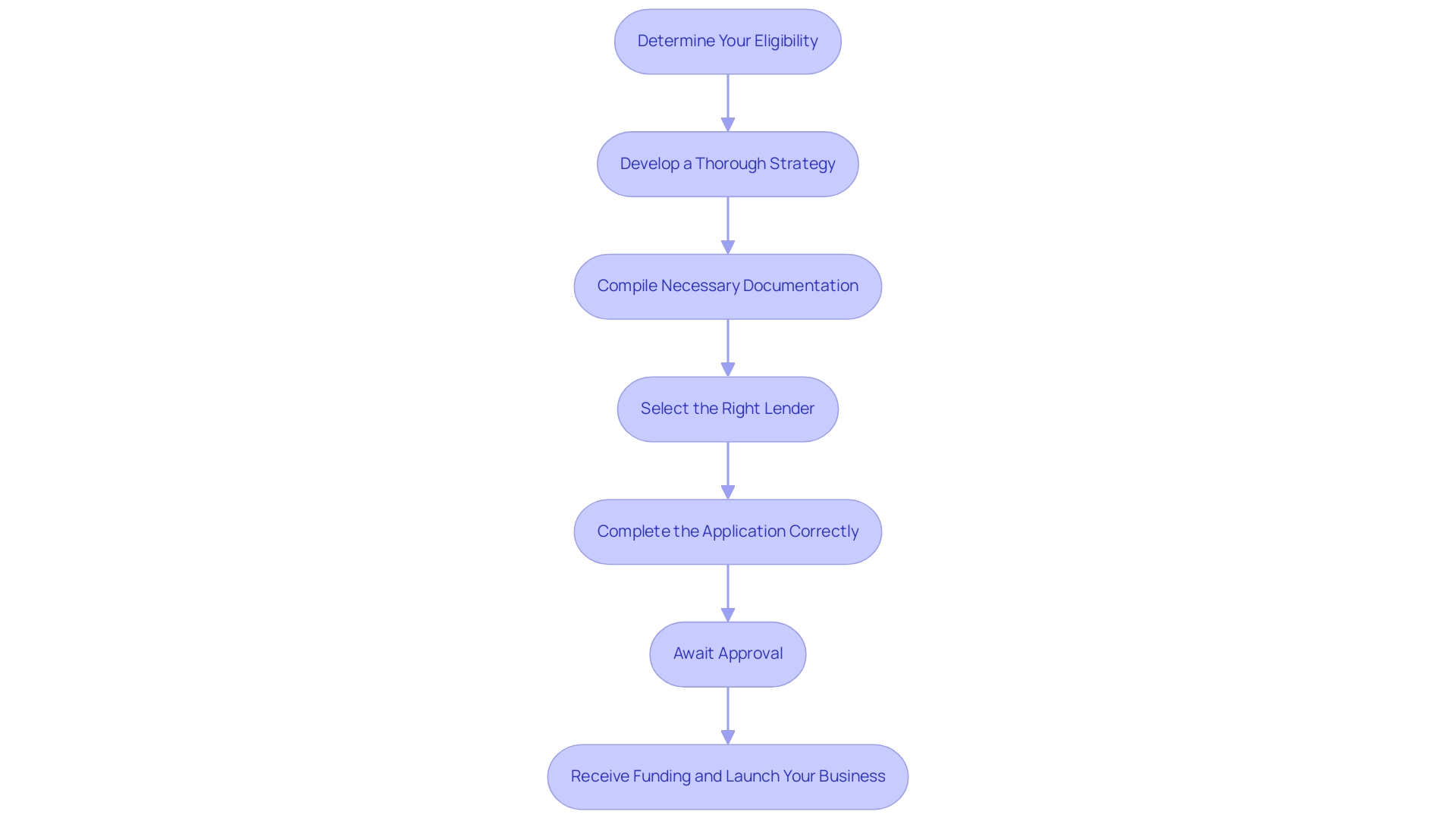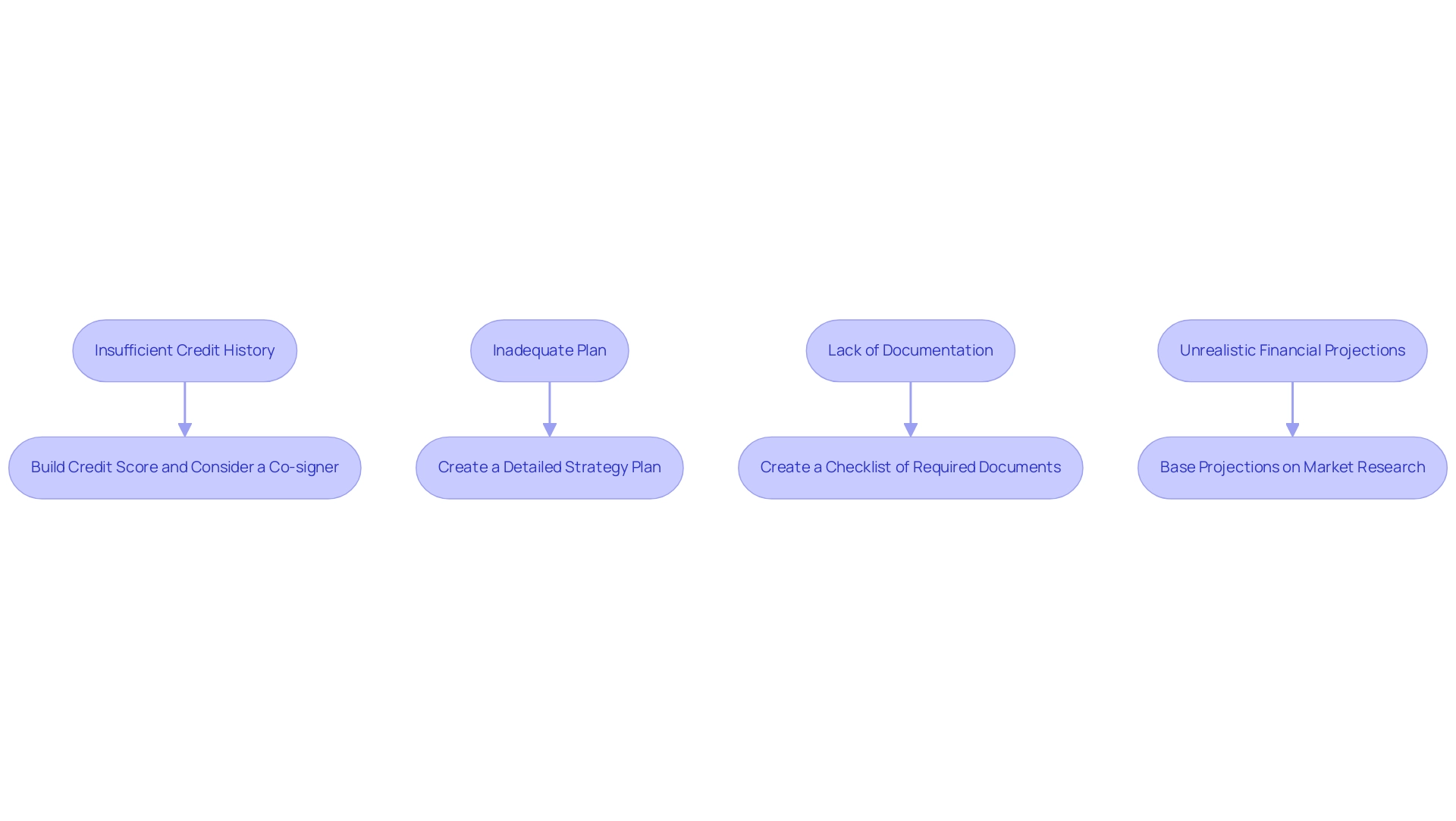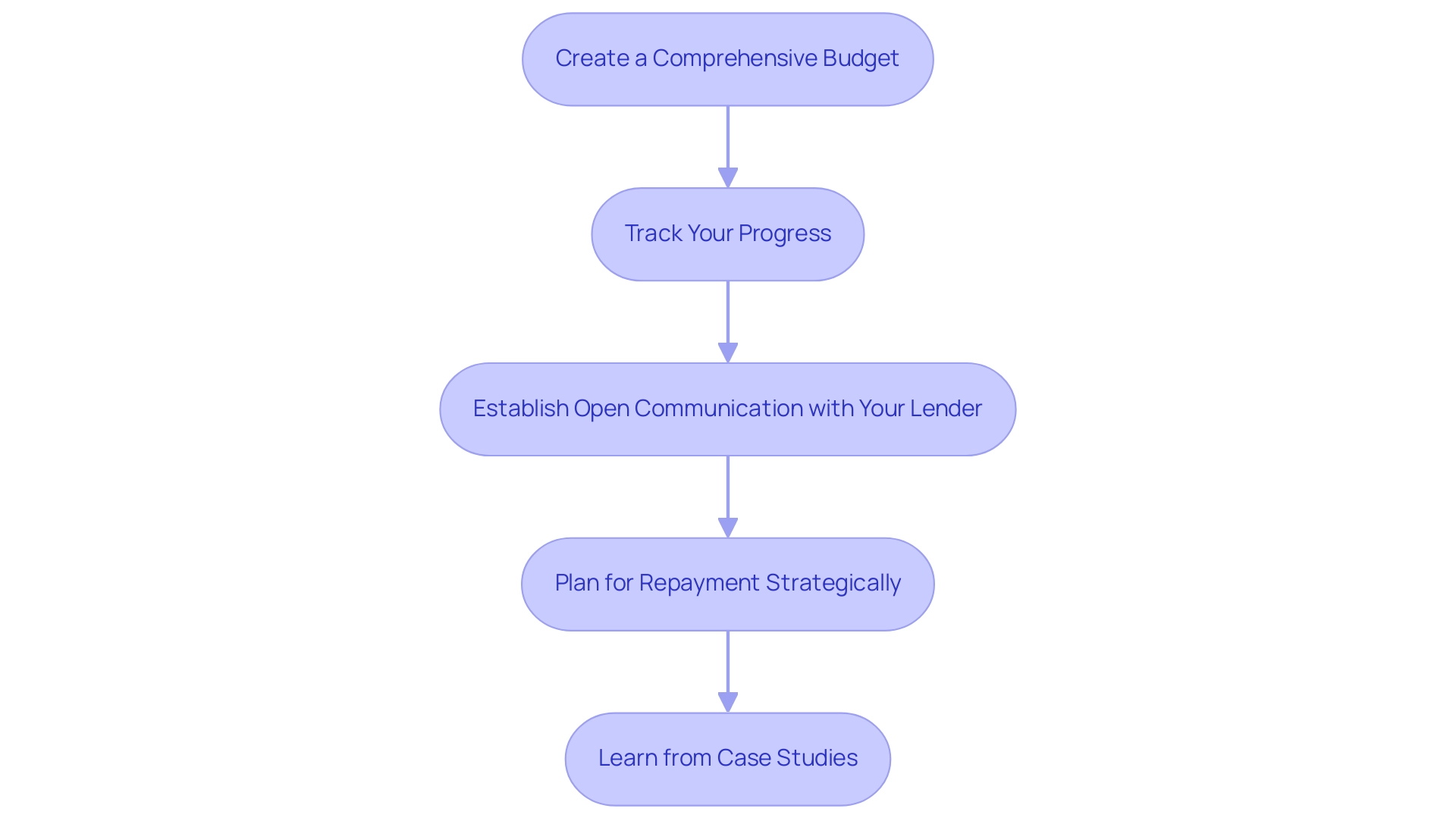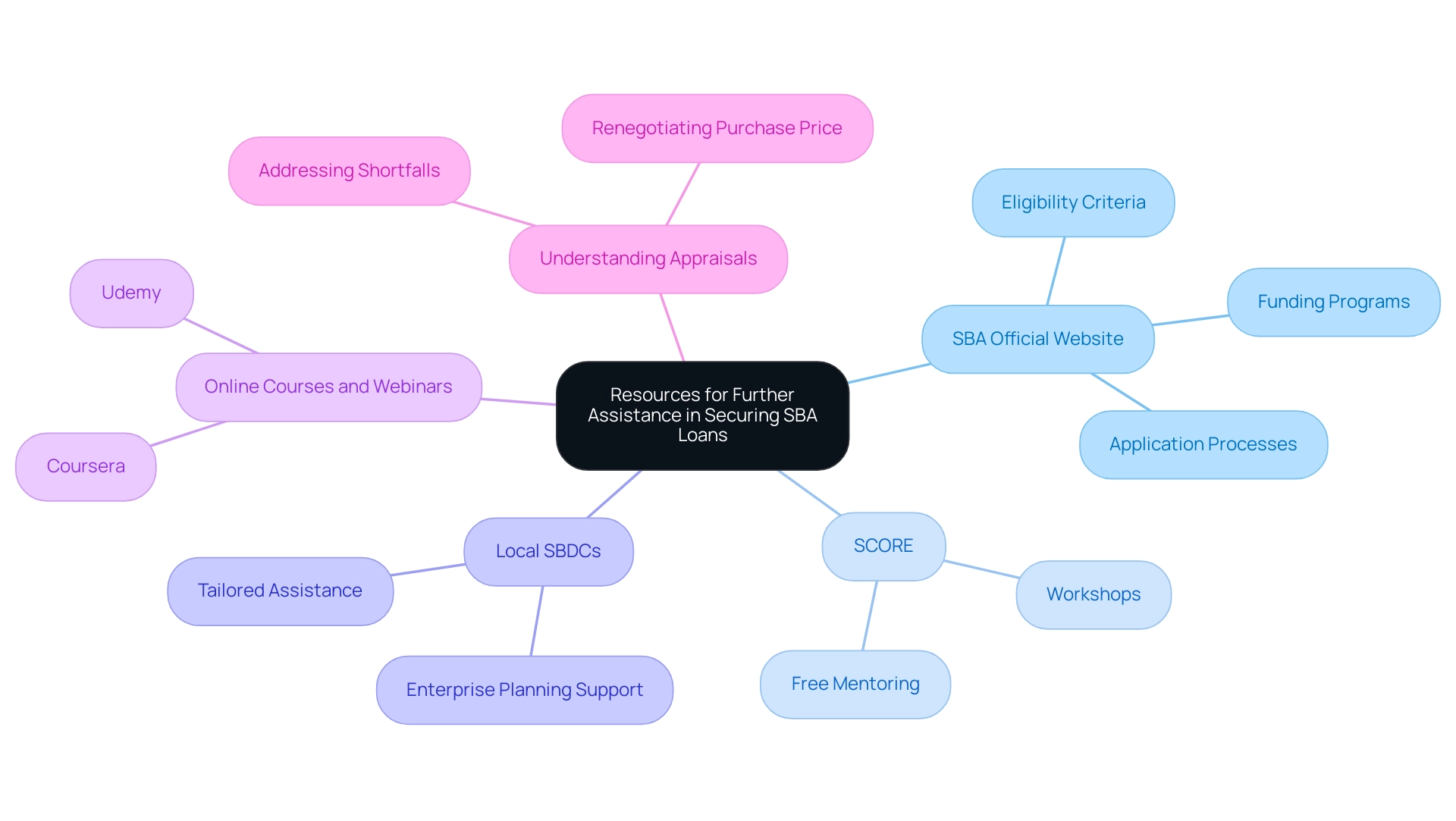Introduction
Navigating the world of financing can be daunting for new entrepreneurs, but understanding the intricacies of SBA loans can open doors to vital resources that fuel business growth. Backed by the U.S. Small Business Administration, these loans not only provide essential funding but also come with the advantage of reduced risk for lenders, enhancing approval chances for startups. As the entrepreneurial landscape continues to evolve, it becomes increasingly important for business owners to grasp the benefits and processes associated with these loans.
From crafting a compelling business plan to overcoming common challenges in securing funding, this guide offers practical insights and actionable steps to empower aspiring entrepreneurs on their journey toward success.
Understanding SBA Loans: A Vital Resource for Startups
SBA loans for start ups, backed by the U.S. Small Business Administration, provide a crucial funding pathway for new businesses aiming to establish and grow their enterprises. With the SBA Houston guaranteeing an impressive $1.53 billion in support to small enterprises in fiscal year 2021, it’s evident that these funds significantly impact the entrepreneurial ecosystem, contributing to job creation and enterprise sustainability. Understanding your goals is crucial, and engaging in coaching can bring clarity to your entrepreneurial journey while helping to navigate challenges.
A coach can help you gain new perspectives, shine a light on your blind spots, and break problematic patterns, which is essential for effective decision-making. The government support associated with SBA loans for start ups minimizes the risk for lenders, thereby enhancing the chances of approval for new businesses.
As a new entrepreneur, it’s essential to manage your personal compensation expectations, recognizing that initial paychecks may be modest. However, with patience and careful monetary planning, you can anticipate a gradual increase in income as your business scales. Among the standout advantages of SBA loans for start ups are:
- Lower down payments
- Extended repayment terms
- Competitive interest rates
These factors together create a more accessible economic landscape for new entrepreneurs.
Additionally, crafting a comprehensive budget that balances fixed and variable costs—while optimizing essential and discretionary expenses—is crucial for strengthening your venture’s financial health. This delineation aids in guaranteeing that you distribute resources efficiently, upholding a quality of life while overseeing your business finances.
For example, collaborating with an SBA Preferred Lender can accelerate the financing approval process and improve local decision-making, providing startups with SBA loans for start ups as a more seamless route to obtaining funding. By grasping these advantages, you can make well-informed decisions regarding the financing options crucial for your startup’s success. As Winston emphasizes,
If your bank is interested in making a difference, contact the SBA Houston District Office at 713-773-6527 for assistance and training.
This proactive strategy can create opportunities for vital resources and assistance for your venture, directly connecting you to the advantages that SBA loans for start ups provide.

Step-by-Step Process to Secure SBA Loans for Your Startup
- Determine Your Eligibility: Before starting the application process for an SBA financial assistance, it’s crucial to assess your eligibility. Typically, you need to operate a for-profit enterprise in the United States, demonstrate personal investment in the venture, and articulate a clear need for the funds. Each SBA financing program, such as the 7(a) and CDC/504 options, has specific criteria that you must review to ensure you meet their requirements.
- Develop a Thorough Strategy: A strong plan is crucial for your financing application. This document should clearly outline your enterprise goals, conduct a thorough market analysis, present budget forecasts, and detail how you intend to utilize the loan funds. Your venture plan serves not only as a roadmap for your operations but also as a persuasive tool to convince lenders of your viability.
- Compile Necessary Documentation: Gather all required documentation, including personal and corporate tax returns, detailed monetary statements, and pertinent legal documents such as licenses and leases. It’s essential to comprehend that enterprise monetary statements consist of three parts: profit and loss statements, cash flow statements, and balance sheets. The SBA requires comprehensive documentation to evaluate your business’s financial health and potential for success.
- Select the Right Lender: Investigate lenders that actively participate in SBA lending. Compare their terms, fees, and customer service approach. It’s advisable to partner with a lender experienced in SBA financing; they can provide invaluable guidance throughout the application process. Applying for an SBA financing option can be straightforward with the right lender, which emphasizes the importance of this selection.
- Complete the Application Correctly: Carefully fill out the SBA funding application forms, which include the SBA Form 1919 for enterprise information and the SBA Form 912 for personal history. Ensure that all details are accurate and complete to prevent any delays in processing your application.
- Await Approval: Once your application is submitted, the lender will review it and may require additional information. Be prepared to respond to inquiries and provide further documentation as necessary to facilitate the approval process. After SBA approval, companies will receive an initial commitment detailing the financing terms, followed by a closing process that can take a few weeks to a month.
- Receive Funding and Launch Your Business: Upon approval, you will obtain the financial resources. Utilize these resources as outlined in your plan to ensure the success of your startup. As you begin this journey, carefully oversee your finances to fulfill repayment responsibilities, which is vital for maintaining your business expansion.
Caitlin Rose from Small Business Blog highlights that SBA loans for startups provide small businesses with flexible, low-cost funding, making it easier to obtain the capital they require to grow. This flexibility is a crucial factor in utilizing SBA funding for your entrepreneurial aspirations.

Common Challenges in Securing SBA Loans and How to Overcome Them
Securing sba loans for start ups can be challenging, but being aware of common pitfalls can help you navigate the process more effectively. Here are a few challenges and solutions:
-
Insufficient Credit History: Many startups struggle with limited credit history, making sba loans for start ups a crucial option for them. To overcome this, build your personal credit score by paying bills on time and reducing debt.
Consider seeking a co-signer with a strong credit history. -
Inadequate Plan: A vague or poorly structured plan can hinder your application for sba loans for start ups. Invest time in creating a detailed and compelling strategy plan. Seek feedback from mentors or advisors to strengthen your application for sba loans for start ups.
-
Lack of Documentation: Missing or incomplete documentation can delay your application. Create a checklist of required documents early in the process and ensure everything is organized and ready for submission.
-
Unrealistic Financial Projections: Overly optimistic financial projections can raise red flags for lenders. Be realistic and base your projections on thorough market research and industry standards. Consider using conservative estimates to demonstrate a cautious approach to growth.

Tips for Successful Loan Management After Approval
Upon obtaining your sba loans for start ups, effective management becomes essential for your enterprise’s success. Here are essential steps to guide you:
-
Create a Comprehensive Budget: Start by developing a detailed budget that clearly outlines how you plan to allocate your loan funds. This budget should reflect all anticipated expenses and revenues.
Regularly monitor your spending to ensure you remain within your budget parameters, and be prepared to make adjustments as necessary. -
Track Your Progress: Consistently review your business’s performance against your original business plan. This will allow you to spot areas needing improvement and confirm that you are on track to meet your financial goals. Keeping a close eye on your metrics is key to navigating any challenges that may arise.
-
Establish Open Communication with Your Lender: Foster a strong relationship with your lender by maintaining open lines of communication. If you encounter any difficulties, it’s vital to inform them early on so you can explore potential solutions together. As a budget analyst observed,
Although Finance offers direction concerning repayment, it does not establish responsibility for reimbursement.
This emphasizes the critical need for you to take an active role in managing your obligations, especially given the existing lack of clarity regarding who is responsible for ensuring repayment. -
Plan for Repayment Strategically: Familiarize yourself with the specific terms of your repayment. Create a plan to set aside funds each month to ensure you can meet your obligations without undue stress. Furthermore, think about creating a reserve fund to address any unforeseen costs that might occur, thus protecting your enterprise’s economic well-being.
-
Learn from Case Studies: Reflect on the case of the California Department of Public Health’s Office of Problem Gambling, which struggled due to ineffective monitoring of its programs. This highlights the significance of routinely assessing your financial practices and adjusting as necessary to ensure effective management of your SBA loans for start ups.

Resources for Further Assistance in Securing SBA Loans
To improve your chances of obtaining SBA financing, consider utilizing the following essential resources:
- SBA Official Website: The U.S. Small Business Administration’s site is a cornerstone for small enterprises, offering extensive information on various funding programs, including the SBA 7(a) option, eligibility criteria, and detailed application processes to ensure you have a solid understanding of what to expect.
- SCORE: This nonprofit organization stands out for providing free mentoring and workshops tailored for small enterprises. With the guidance of seasoned mentors, you can enhance your plan and prepare thoroughly for funding applications, significantly boosting your confidence and competitiveness.
- Local Small Enterprise Development Centers (SBDCs): These centers play a crucial role in assisting entrepreneurs. They provide tailored assistance on enterprise planning and navigating the often intricate funding process, ensuring that you have the support you require at every stage.
- Online Courses and Webinars: Educational platforms like Coursera and Udemy offer a variety of courses centered on enterprise planning and financing. Engaging with these resources can deepen your understanding of SBA financing and small business funding, equipping you with essential knowledge that can aid your application process.
- Understanding Appraisals: Keep in mind that if a property appraisal indicates a value less than the deal, both the borrower and lender may need to address the shortfall or renegotiate the purchase price. This highlights the importance of being prepared for potential appraisal outcomes when applying for SBA loans for start ups. By utilizing these resources and being aware of the complexities involved, including the availability of more than 15 loan options through Pursuit, you can navigate the SBA loans for start ups landscape more effectively, increasing your chances of success.

Conclusion
Navigating the landscape of SBA loans is a crucial step for aspiring entrepreneurs seeking funding to launch and grow their businesses. These loans, backed by the U.S. Small Business Administration, offer a range of benefits, including lower down payments, extended repayment terms, and competitive interest rates. Understanding the eligibility criteria, crafting a robust business plan, and gathering the necessary documentation are foundational steps in the application process that can significantly enhance approval chances.
While the journey to securing an SBA loan may present challenges, such as limited credit history or inadequate business plans, being aware of these obstacles allows entrepreneurs to proactively address them. Effective management post-approval is equally essential; creating a detailed budget, tracking financial progress, and maintaining open communication with lenders are critical practices that contribute to long-term business success.
Utilizing available resources, including the SBA’s official website, local development centers, and mentoring organizations like SCORE, can further bolster your efforts in securing funding. By leveraging these tools and insights, entrepreneurs can confidently navigate the complexities of SBA loans, transforming their business aspirations into reality. Ultimately, with diligence and strategic planning, the path to financial support becomes clearer, empowering new ventures to thrive in a competitive marketplace.


